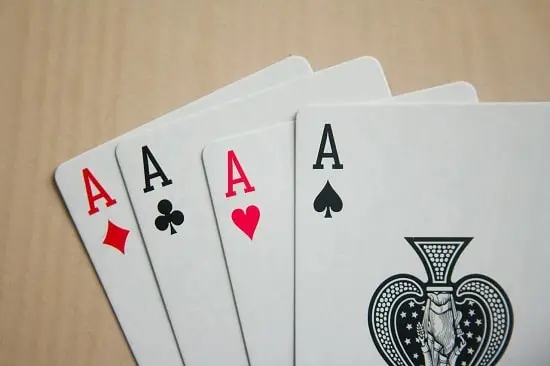Playing cards makes one look cool, is a thought shared by many. James Bond, the showman also flaunted his card-playing abilities. Who knew that something as simple as playing cards could be so much fun and addicting?
Each card game has its advantages and disadvantages. While some card games can be finished in a few minutes, others can take several hours. Due to the wide variety of card games available nowadays, people are getting more addicted to this game.
To know more, let’s understand few advantages and disadvantages of playing card games in detail:

Advantages of playing card games
1. Keeps mind active and sharp
Card games have been shown to improve cognitive abilities like processing speed & problem solving, according to research. Card games have been dubbed “brain training games” by academics, and it stands to reason that they can be used to maintain mental acuity if played correctly.
2. Improves social skills
Some people have difficulty expressing themselves verbally. Card games are a great icebreaker for a group whose members might not know how to talk to one other naturally.
Playing a game of cards is a great way to break the ice and give socially awkward folks something to focus on besides having to make conversation. If you and your friends are having trouble coming up with things to say to each other, consider talking about the game you’re playing.
3. Improves patience level
When playing cards, one of the most important things to remember is to wait your turn. As a result, you have to hold your need to get ahead in check and instead concentrate on what the other players are doing. This has dual benefits: it helps kids learn to focus and be patient (particularly those who are still developing impulse control).
4. Relieves stress
Card games are fun and social, and can help you unwind after a long day. Playing cards requires full attention, as you must keep track of the game’s rules, your own cards, and the moves of your opponents. Your head is completely full, with no room for anything else. Playing cards might provide as a welcome diversion from everyday worries.
5. Improves memory skills
A card game can be a great technique to improve memory without knowing it is working. If you want to win, you have to keep track of the cards that have been played, the moves that were executed, and the general comments & actions of the other players. All of this information will be useful when it is finally your turn.
6. Offers health benefits
Feelings of sadness can be alleviated by sitting around a card table with loved ones and having a good time. This easy exercise improves happiness and promotes communication between participants. Therefore, it can aid in reducing depressive symptoms. Card games are also a great way to improve your memory and sharpen your thinking.
7. Can be played by anyone
As we become older, we tend to lose sight of the fact that our guardians are becoming older, too. It can be challenging to find time for spending time together in a family when everyone’s daily routines pull them in separate directions.
Because of its accessibility and enjoyment across generations, card games have long been a favorite method for families to spend quality time together.
8. Improves logical and mathematical thinking
Mental arithmetic and deductive reasoning are commonplace in many card games. Card games are a great way to exercise our brains and improve our memory.
There is counting involved when one must pick up cards. Extra calculations are required at the end of the game when everyone adds up their cards & points to determine a victor.
To succeed in many games, you need to pay close attention and think logically about your next action.
Disadvantages of playing card games
1. Players limit
Is there a maximum hand size in poker? Playing popular card games often requires a minimum of two people and, depending on the game, a maximum of four or six decks. Some members of a large group may feel excluded if they are unable to take part in the activity.
2. Encourages violence
Some people are too sensitive, and they get into confrontations if they lose at cards. Anger and anger can set in if they keep losing to other players. This annoyance can build with each round, and violence may (and frequently does) break out.
3. Waste of money
Some people use their cards to gamble, which can result in significant financial losses. If you play card games for money regularly, you probably lose more often than you win.
Losing even a little bit of money over time can have a significant influence on your financial situation. Avoid losing cash by betting on games that few other people care about.
4. Trigger health issues
There are some positive health effects of card playing, but it can also lead to some undesirable side effects. Depressive and anxious feelings have been linked to card playing. Sleeplessness, increased risk of gambling, and other health issues may accompany a card game addiction.
5. May develop bad habits
The vast majority of card players have no idea when to stop. It starts out as a fun pastime but develops into something much deeper and more significant over time. Some people make a habit of playing cards, which might have negative consequences for their interpersonal connections.
Conclusion
There are several advantages and disadvantages of playing card games, as you can see. If you’ve been debating whether or not to include card games in your social gatherings, you must weigh both these pros and cons and then make a right decision.
Santosh Kumar is a Professional SEO and Blogger, With the help of this blog he is trying to share top 10 lists, facts, entertainment news from India and all around the world.
